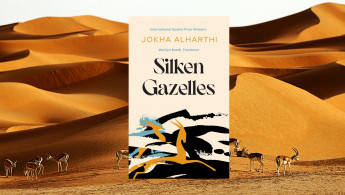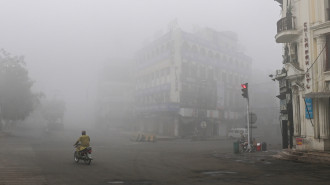Navigating changes to Omani society through love and loss in Jokha Alharthi’s Silken Gazelles
Omani women have always been at the heart of Jokha Alharthi’s stories, including her latest book Silken Gazelles.
Originally published in Arabic in 2021 and translated into English this year, the novel looks at friendship and love, as well as the big changes Omani women have faced since the 1970s.
Silken Gazelles is Alharthi’s fourth novel and tells the story of Ghazaala and her childhood friendship with Asiya. The two girls meet as toddlers and when Ghazaala is abandoned by her grieving mother, Asiya’s mother, Saada, takes her in. By breastfeeding Ghazaala, Saada creates a special bond between them, making them milk sisters.
As they grow up together, this bond strengthens. Asiya becomes a protective big sister and a fun playmate in a changing Omani society. However, after Saada’s death, Asiya disappears from Ghazaala’s life, leaving her with a deep sense of emptiness, especially on tough days.
"What’s striking about Alharthi’s examination of love in the story is not just its presence, but also its absence"
As the story develops, we learn that Ghazaala develops a love for swimming, which brings her comfort amid her loss. It’s a joyful activity she shared with Asiya that made them feel free and alive in their small village: “But she returned to the sea on a hundred days, and finally she regained the memory lost to her — the years of blanked-out memory. Swimming saved her. It helped her, or went some way toward helping her, to make her peace with Asiya’s departure, when her friend hadn’t even said goodbye.”
Similarly, Harir, another key character in the novel, experiences intense friendships that leave her feeling empty when they end. Her connection with Ghazaala is also complicated and does not seem to be entirely mutual.
To fill this gap, Harir tries to form quick friendships, like a brief connection with Asiya in university, a friendly relationship with her husband, and an awkward attempt to befriend Ghazaala’s aunt.
However, like Ghazaala, Harir finds that only through returning to horses does she feel that special bond again — one that is innocent and untouched by the complexities of adult life.
An exploration of the different forms of love, or the lack of it
Beyond friendship, love is another important theme in Silken Gazelles.
The two main characters, Ghazaala and Harir, have different views on love that sometimes clash.
Ghazaala often falls head over heels for new men, but each one ends up disappointing her. For her, life without love feels unbearable.
In contrast, Harir sees love as a practical matter and doesn’t feel much loss, even admitting she probably never truly loved her husband.
Ultimately, what brings the two women together is their shared understanding that they will never know true love like the unconditional love they experienced in their childhood friendships. Ghazaala thinks to herself, "The unconditional love from Saada and Asiya had never come to her again."
What’s striking about Alharthi’s examination of love in the story is not just its presence, but also its absence.
While Ghazaala is fortunate enough to experience love, the other women do not. Her aunt, despite being surrounded by romantic songs and movies, never truly knows what love is. Harir’s mother, who married at a very young age, lives a loveless life with her husband.
These different experiences of love highlight the complexity of Omani women's lives, showing that they cannot all be labelled the same.
As these women deal with their experiences of love and friendship, they also face rapid changes in Omani society. The speed of these changes makes it harder for them to adapt, as they juggle new expectations along with the traditional roles they have always known.
For example, Ghazaala, Harir, and their co-workers are expected to move beyond being just wives, mothers, and daughters. They also need to be educated and working women. This shift adds a lot of pressure, especially since their mothers and aunts faced similar tough expectations.
In the novel, Ghazaala’s aunt, already overlooked and disregarded for being an unmarried woman over thirty, faces pressure to pursue the education she missed out on as a child, often without consideration for her own desires and wishes.
At the same time, Harir’s mother, who married as a teenager, is criticised by her husband and daughter for not wanting to return to her studies. She is seen as immature, lacking true understanding of her own circumstances.
Connecting the novel to Oman
Though Alharthi doesn’t see fiction as a way to document reality, Silken Gazelles is very much inspired by Oman.
This is especially clear in her portrayal of foreign workers, whom she describes kindly and without labels, whether it’s the cook Najib or Harir’s maid, Josephine. They are shown, even briefly, as people with their own struggles and lives.
The novel also reflects Omani culture through its mentions of the dishdasha, the inherited dagger, the abaya, Omani coconut sweets, and traditional Omani music.
What further connects the novel to Oman in its English translation is the translator's (Marilyn Booth) social and cultural details of Oman, which are clearly expressed in the text.
This can be seen in her use of Omani words like “ummi” and “ayba,” as well as in the chant by Saada to her child:
When Old Raaya rapped on the door, Asiya opened it.
Saada’s voice could be heard from inside the house, happy
and vigorous, as she bounced Zahwa to the rhythm of her
chant. “Ba’ jin wa-baghrif wa-batlaa fil-ghuraf . . . I knead and
I ladle and I climb to the higher rooms.”
Silken Gazelles has won the Man International Booker Prize and is now available to purchase online or in person.
Saliha Haddad is an Algerian journalist, writer, teacher, and literary agent.
Follow her on Twitter: @sallyhad3




 Follow the Middle East's top stories in English at The New Arab on Google News
Follow the Middle East's top stories in English at The New Arab on Google News


